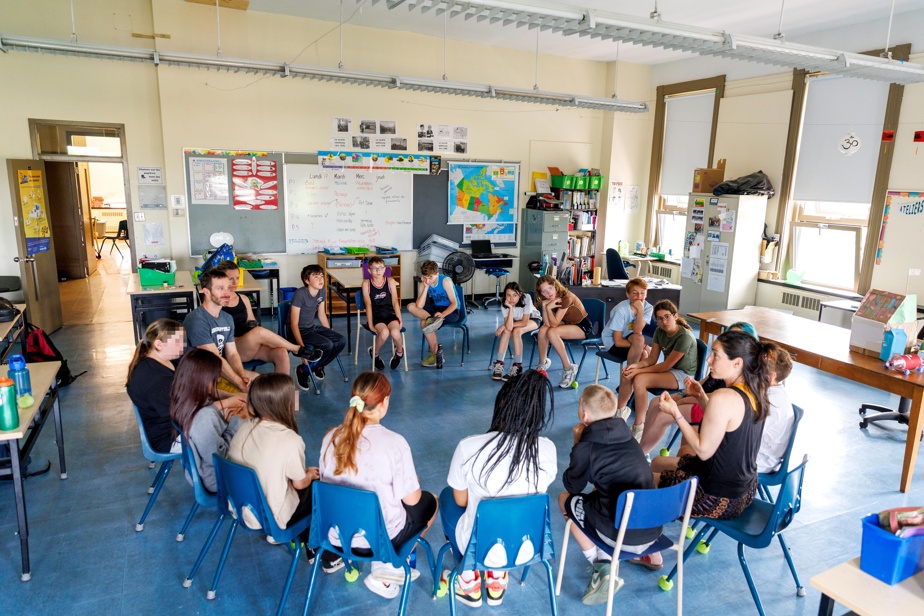A sense of excitement fills the young people in Geneviève St-Maur’s class as they sit in a circle. The oppressive heat that penetrates through the windows of the room reminds them that summer is just around the corner. However, this promise of imminent vacation is not the only reason behind the smiles of the 18 Grade 6 students.
For the tenth and last time, the group from Saint-Clément school, in the Hochelaga-Maisonneuve district, receives a visit from artist-mediators Sandy Bessette and Simon Fournier, from the company La marche du crabe. Since September, young people have been participating in the Passages project, one of the objectives of which is to give them tools to better experience the transition between primary and secondary school.
A few days before the end of classes, it is time to take stock. The two facilitators would like to look back on the eight workshops and the two plays that the students attended as part of the project.
“We have 50 minutes. This is too short ! We won’t have time to tell each other everything,” Simon Fournier warns them, with regret.
But before opening the discussion, it’s time to play. Because during the year, the game has been at the heart of all the workshops. There is no question of this final meeting being an exception.
“We are going to play the name game,” announces Simon Fournier.
The students are visibly delighted. Without being asked, they list the rules: the first to stand up 10 times and say their name loud and clear wins. If two people stand up at the same time, they are eliminated by the judge.
And what is this judge like? “Ruthless and cruel,” the children say cheerfully.
Game on. Some get up repeatedly, hoping to reach the famous ten before everyone else. To prevent a friend from winning, a boy dares to move at the same time as him. Exclamations congratulate this sacrifice. Laughter breaks out.
What takes place in the classroom seems to be just a game. And yet, through this, and all the others explored during the year, students acquire skills. During a previous meeting, they were called upon to create political parties in a fictional city and to take a position on divisive issues. “In Frog City, is it allowed to have cell phones in class? ”, for example, the judge asked them – always ruthless and cruel. Through this exercise, they had to form an opinion, find arguments to defend it, debate…
“The Passages project, I think it gave them confidence. It allowed them to take their place, but also to leave room for others,” notes their teacher, Geneviève St-Maur.
Because if the games led by artist-mediators invite people to speak, they also promote listening. “In all our discussion games, they have to let the people who are speaking finish their turn before saying anything, whether they agree or not. It develops their ability to communicate in society,” explains Sandy Bessette.
This last remark echoes Victor, one of the two alley theater plays presented to them as part of the project. In this work created by La marche du crabe, we follow friends the day before they enter high school. On the verge of leaving childhood for adolescence, each of them has apprehensions about this new stage. The friends meet in their alley to play like old times and immerse themselves in their imagination.
During class discussion, students draw several similarities between themselves and the characters. Some people won’t go to the same high school as their friends and that worries them. Others are excited by the idea of being able to reinvent themselves. Everyone seems to agree that for some time now, they have been delving into their imagination less often.
The students of Saint-Clément school were not the only ones to participate in this first year of the Passages project. A reception class from Notre-Dame-de-la-Paix school, in the Verdun district, also attended the workshops.
On a few occasions during the project, the young people from the two schools met. “When we go to secondary school, we sometimes leave our friends from the small school. We are forced to get in touch with other people,” emphasizes Sandy Bessette, who sees this twinning as a way to “test these first new encounters.”
For Roxane Boucher-Desrochers’ reception class, the workshops represented a certain challenge since the majority of students arrived in the country less than two years ago. “It allowed them to develop both the language and their self-assertion, their self-confidence. It’s very beautiful to see,” the teacher points out with pride.




